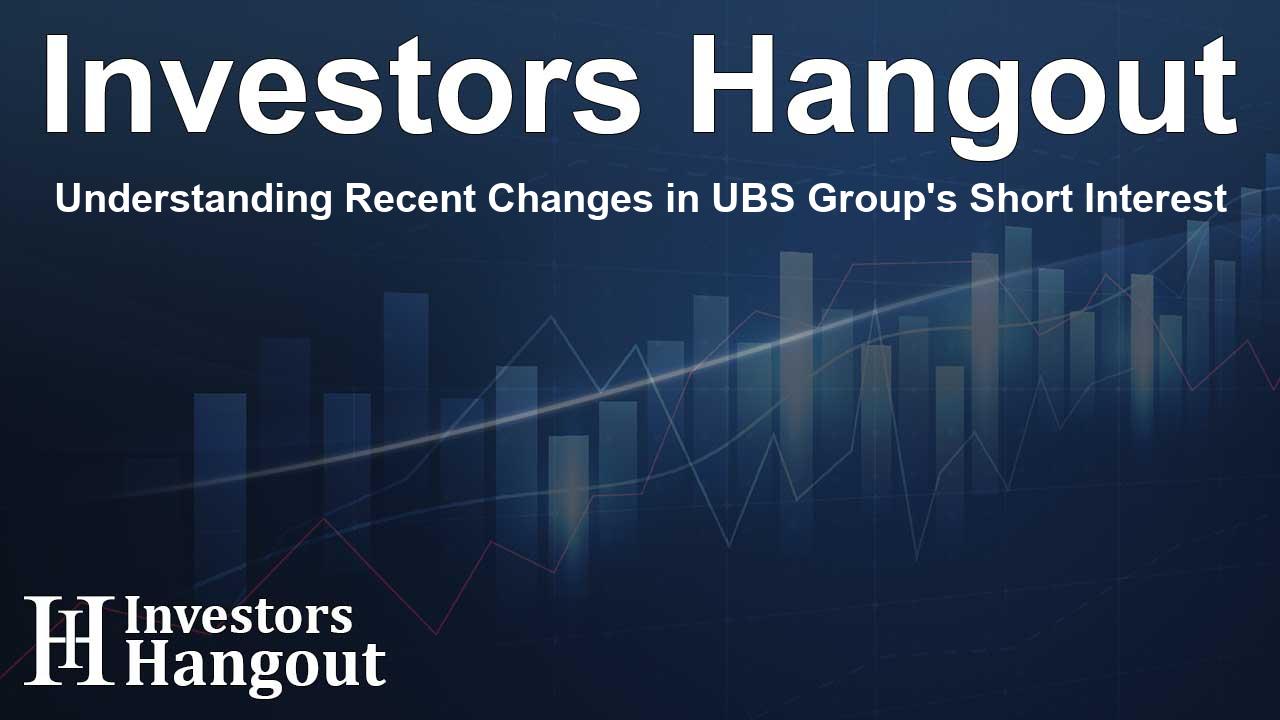Understanding Recent Changes in UBS Group's Short Interest

Understanding Recent Changes in UBS Group's Short Interest
UBS Group (NYSE: UBS) has reported a notable drop in its short percent of float, which has decreased by 11.9% since the last reporting period. Currently, the company has around 11.80 million shares sold short. This figure represents approximately 0.37% of the total shares available for trading. Given the current trading volume, traders require about 8.02 days on average to cover their short positions.
Importance of Monitoring Short Interest
Short interest plays a significant role in the stock market. It refers to the total number of shares that have been sold short but remain open, meaning they haven't been bought back yet. In essence, short selling occurs when a trader bets against a stock by selling shares they do not own, anticipating a fall in the stock price. If this price indeed drops, the trader can cover their position at a profit; conversely, they will incur losses if the price increases.
Tracking short interest can provide valuable insights into market sentiment related to a specific stock. For instance, a rise in short interest often indicates heightened bearish sentiment among investors, whereas a decline may suggest a shift towards bullishness.
UBS Group's Short Interest Trends
Recent data shows a decrease in the percentage of shares that are shorted for UBS Group. While this decline may not directly equate to an imminent stock price increase, it's crucial for traders to be informed that there are fewer shares being shorted, which can influence market dynamics.
Comparing UBS Group's Short Interest to Industry Peers
Analyzing short interest in the context of industry peers is a common practice among investors. This technique helps in measuring how well a company is performing compared to similar firms regarding market sentiment. Companies that exhibit similar characteristics, such as industry type, size, and financial structure, form a peer group.
According to market estimates, the average short interest for UBS Group's peer group sits at 2.25%. This metric highlights that UBS has a lower short interest relative to most of its competitors, suggesting a more favorable outlook compared to its peers.
The Potential Bullish Nature of Increasing Short Interest
Interestingly, rising short interest can sometimes be indicative of bullish potential for a stock. This counterintuitive perspective arises from the possibility of a short squeeze, where a rapid increase in stock price forces short sellers to buy back shares, contributing to further upward price momentum. Understanding this phenomenon can provide investors with unique strategies to capitalize on market movements.
Final Thoughts on Short Interest Trends
In summary, the evolving short interest landscape for UBS Group presents important implications for investors. With the current short interest decreasing, it signals a potentially more positive market sentiment. Investors should continue to monitor these trends as they can impact trading strategies and overall investment decisions.
Frequently Asked Questions
What is short interest?
Short interest refers to the total number of shares sold short that have not yet been covered. It is a common indicator of market sentiment for a stock.
How does short selling work?
Short selling involves selling shares that a trader does not own, betting that the price will decrease. If the price drops, the trader can buy back the shares at a lower price, realizing a profit.
Why is tracking short interest important?
Watching short interest can help gauge investor sentiment. An increase generally indicates bearish views, while a decrease suggests bullishness.
How does UBS Group's short interest compare to its peers?
UBS Group has reported a lower short interest compared to the average of its peer group, indicating a potentially less bearish outlook than many competitors.
Can increased short interest be a good sign for stocks?
Yes, rising short interest may lead to a short squeeze, which can push stock prices higher, presenting investment opportunities.
About Investors Hangout
Investors Hangout is a leading online stock forum for financial discussion and learning, offering a wide range of free tools and resources. It draws in traders of all levels, who exchange market knowledge, investigate trading tactics, and keep an eye on industry developments in real time. Featuring financial articles, stock message boards, quotes, charts, company profiles, and live news updates. Through cooperative learning and a wealth of informational resources, it helps users from novices creating their first portfolios to experts honing their techniques. Join Investors Hangout today: https://investorshangout.com/
Disclaimer: The content of this article is solely for general informational purposes only; it does not represent legal, financial, or investment advice. Investors Hangout does not offer financial advice; the author is not a licensed financial advisor. Consult a qualified advisor before making any financial or investment decisions based on this article. The author's interpretation of publicly available data shapes the opinions presented here; as a result, they should not be taken as advice to purchase, sell, or hold any securities mentioned or any other investments. The author does not guarantee the accuracy, completeness, or timeliness of any material, providing it "as is." Information and market conditions may change; past performance is not indicative of future outcomes. If any of the material offered here is inaccurate, please contact us for corrections.